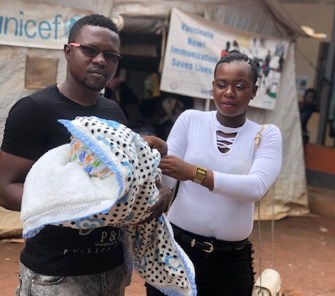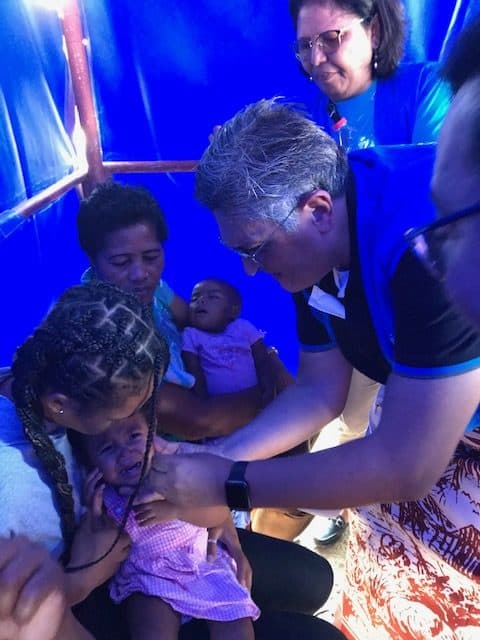Reflections on World Immunization Week: 20 years of experience from across the globe
April 30th, 2021 | viewpoint
This year, World Immunization Week (WIW) focused on how Vaccines Bring Us Closer and the impact they have on public health systems. Attention has grown around not only how COVID-19 has impacted health systems, but the contributions that vaccines have on preventing diseases and building healthier and more resilient societies. JSI senior technical officer and Immunization Lead for the USAID-funded MOMENTUM Integrated Health Resilience project, Dr. Enrique Paz, reflected on World Immunization Week and his work to integrate routine immunization services with other essential maternal, newborn, and child health (MNCH) services for MOMENTUM Integrated Health Resilience.
Q. Tell us about your involvement in WIW in the past, and how important this week is for future activities.
My first involvement in WIW was back in 2002, when I was the Minister of Health in Bolivia. Ministers of health from Bolivia, Colombia, Chile, Ecuador, Venezuela, and Peru, under the auspices of the Andean Health Organization (ORAS), started Andean Vaccination Week (AVW). We created AVW to promote vaccination programs in all Andean countries during a measles outbreak in Venezuela. The Andean Health Organization handed this initiative to the Pan American Health Organization (PAHO) and later to the World Health Organization (WHO) to scale it up. After my contribution to AVW, WIW has always been close to my heart.
My second experience with WIW was with UNICEF and PAHO when I was a regional chief of health in Panama. We mobilized and advocated for an integrated approach to promoting immunization, which included other public health services such as HIV, nutrition, and MNCH.

More recently, as Chief of Health in UNICEF Madagascar, in partnership with WHO, GAVI, USAID, and the JSI Immunization Center, we organized several Child Health Days celebrations during the African Vaccination Week (AWV) to catch -up children with vaccines missing and nutrition services.
Now, with the MOMENTUM Integrated Health Resilience project team in South Sudan, we have raised awareness and promoted childhood vaccination with a focus on gender, looking to fathers to be involved with mother and child vaccinations, and to make vaccination beneficial for the entire family.
Q. On this last day of World Immunization Week, can you reflect on what you have seen this week?
Many organizations are of course concerned with COVID-19, and therefore are participating in many events to raise awareness about the possible neglect of routine immunization and other health services. For example, there was a massive online event from Geneva with more than 4,000 participants. It raised the voices of UNICEF, WHO, and civil society organizations. Another USAID-funded MOMENTUM award, MOMENTUM Routine Immunization Transformation and Equity, which is led by JSI, hosted a great webinar with USAID and GAVI immunization leadership. They discussed the critical agenda on gender and immunization, the importance of reducing the number of zero-dose and under-vaccinated children. Other topics included the COVID-19 response, equity issues, and missing funding opportunities for operational costs, as COVID-19 and other priorities make it difficult to cope with routine immunization services.
Q. What are some of the key immunization needs in the world today?
Today, a key immunization need is, of course, the COVID-19 vaccine roll-out and its global availability. It is a major concern and need in all countries. But, at the same time, there is a need to keep up with immunization services for other vaccine-preventable diseases. Without keeping a focus on maintaining routine immunization services, we could be at risk of losing the gains made through vaccination programs for the last 30 years.
Q. What are some ways you integrate immunization into other health services through the programs you support?
We are trying to use all possible immunization platforms to provide MNCH services, and use every point of contact through other health services to vaccinate populations of focus. It is a smart way to integrate vertical programs. There are also specific tools such as the Reach Every District/Reach Every Community (RED/REC) approach that provides techniques to plan outreach services in an integrated manner. For example, if we plan budgets with other child health disease activities, we can mobilize the community and vaccinate or treat children for the three major killers: malaria, tuberculosis, and diarrhea. This also holds true for other MNCH and nutrition services.

Q. How can integrating immunization help to build health resilience?
We have specialist teams in the project that are working on resilience in fragile contexts. From the immunization perspective, we believe that the health systems have collapsed in many areas, and the COVID-19 pandemic has shown how fragile the health systems are to such shocks. COVID-19 will not be the last pandemic; it is time to invest now in reimagining immunization in public health systems.
We would like health systems to be able to provide services before, during, and after unforeseen events in fragile settings. We spend enormous resources on emergency response, but not on health system resilience. We need to create a sense of urgency that leads to improved preparedness to reduce the impact of vaccine-preventable diseases and future pandemics. Prepared health systems should be both reactive to outbreaks and responsive to vaccine-preventable diseases.
We also need strong community health surveillance to strengthen global, national, and local mechanisms to detect infectious diseases, particularly vaccine-preventable diseases. Immunization has that capacity within an integrated epidemic prevention agenda. Immunization systems should be always ready for a surge while also maintaining essential services during a pandemic or other health emergency.
Q. Going forward, what do you think the greatest contributions of immunization will be for programs such as MOMENTUM Integrated Health Resilience?
I think there are a couple of key contributions. The first is through ensuring that project-supported districts create sustainable and resilient integrated immunization outreach, which includes other health interventions like vitamin A supplementation, deworming, and insecticide-treated bed nets. This helps create resilient health systems.
Second, vaccine provision can help bring health programs closer to the community, especially in fragile settings. Vaccines serve as a bridge connecting communities to health care providers while also creating an environment for improving health systems by strengthening information, supply chain, and community health worker capacities.
We strive to build lasting relationships to produce better health outcomes for all.